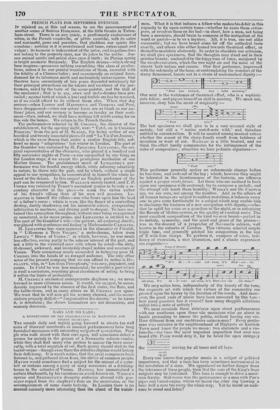FRENCH PLAYS FOR SEPTEMBER EVENINGS.
IT rejoiced us, at this sad season, to see the announcement of another series of Soirees Francaises, at the little theatre in Totten- ham-street. There is an airy gaiety, a gentlemanly exuberance of whim, in the French vaudeville, or petite comedic, with its satire and sentiment, puns and parodies, that gladdens our spirits like sunshine : nothing in it is overstrained and tame, extravagant and vulgar ; its humour is independent of the actor, and its pathos does not belong to the property-man, nor its jokes to the public. Joy- ous animal spirits and genial skies gave it birth ; its Pierian spring • is bright aromatic Burgundy. The English drama—which strong beer inspires—possesses nothing resembling this class of produc- tions, unless it be our painful translations of them, executed with the fidelity of a Chinese tailor; and occasionally an original farce, damned for its laborious mirth and melancholy extravagance. Our theatres have accordingly of late years depended notoriously for their principal attractions on the talents and exertions of the per- formers, aided by the taste of the scene-painter, and the skill of the mechanist ; that is to say, stars and melo-dramas have pre- vailed ; against both of which a loud and foolish cry has been raised, as if we could afford to do without them also. When that day arrives—when LISTON and MATTHEWS, and TOMKINS and PITT, have disappeared—when our actors' faces are as blank as our au- thors jokes, and our scenery is become as tawdry as their senti- ment—then, indeed, we shall have nothing left worth caring for on this side the lamps. We return to the French theatre.
The performances selected by M. CHEDEL, the director of the establishment, for the opening night, were " Vatel, on le Cuisinier Francais," from the pen of M. ScarnE, the living author of one hundred and twenty successful pieces (!) and " La Vie d'un Joueur," which is the same drama that, under a similar English title, suf- fered so many " adaptations" last winter in London. The part of the Gambler was sustained by M. FREDERIC LEMAISTRE, the ori- ginal representative of the character, who played it a hundred and fifty successive nights at Paris—a run unequalled by any thing on the London stage, if we except the prodigious incubation of our Mother Goose. The predominant merit of LEMAISTRE-S per- formance was the fearful energy which, while adhering admirably to nature, he threw into the part, and by which, without a single appeal to our sympathies, he concentrated in himself the whole in- terest of the drama. In this respect no English performer of the part can be compared to him. WALLACK merely ranted ; and T. P. CooKE was reduced by TERRY'S ascendant genius to be only a se- condary character in the piece—to seem the victim rather of his friend's villany than of his own evil passions. LE- MAISTRE is himself the villain—one who bears upon him the load of a father's curse ; which is seen, like the finger of a controlling destiny, darkly shadowing out his miserable career, exasperating infatuation to madness, and driving guilt to despair. To have sus- tained this conception throughout, without once being exaggerated or unnatural, is no mean praise, and LEMAISTRE is entitled to it. The part of the Gambler's wife—the patient, all-enduring Ana lie, was played with gentleness and feeling by Mademoiselle CAROLINE. M. LEMAISTRE has since appeared in the character of Vivaldi, in " L'Homme a Trois Visages," a melo-drama, taken from LEWIS'S " Bravo of Venice ;" in which, however, he was much less effective, owing partly to the inferior interest of the part, and not a little to the wretched crew with whom lie acted—the dirty, ill-dressed, awkward, and invincibly stupid nobles and senators of Venice. Their conspiracy nearly succeeded in betraying poor M. -CHEDEL into the hands of an enraged audience. The only other actor of the present company that we can affbrd to notice is Du- PLANTY, who, in " Les deux Precepteurs," was easy, impudent, and comic. In Vatel he was less successful; he overdid a part which is itself a caricature, requiring great chasteness of acting to bring it within the limits of probability.
M. CHEDEL'S orchestral arrangements displease us ; we never listened to more villanous music. It would, we suggest, he consi- derably improved by the absence of the .first violin, the flute, and the kettle-drum, and as many others as M. CHEDEL can spare. We trust that he will also get his scenery cleaned, and his scene- shifters properly drilled—" l'organisation des decors," as he terms it, is detestable ; the, decors themselves are not decorative, and scarcely decorous.


















 Previous page
Previous page